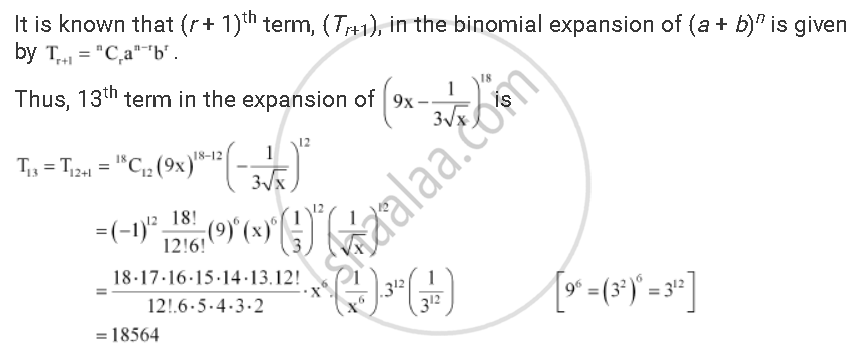Advertisements
Advertisements
Question
Find the 13th term in the expansion of `(9x - 1/(3sqrtx))^18 , x != 0`
Solution

APPEARS IN
RELATED QUESTIONS
Find the coefficient of x5 in (x + 3)8
Find the coefficient of a5b7 in (a – 2b)12
Find the middle terms in the expansions of `(3 - x^3/6)^7`
Find the middle terms in the expansions of `(x/3 + 9y)^10`
The coefficients of the (r – 1)th, rth and (r + 1)th terms in the expansion of (x + 1)n are in the ratio 1:3:5. Find n and r.
Find n, if the ratio of the fifth term from the beginning to the fifth term from the end in the expansion of `(root4 2 + 1/ root4 3)^n " is " sqrt6 : 1`
Find the middle terms in the expansion of:
(ii) \[\left( 2 x^2 - \frac{1}{x} \right)^7\]
Find the middle terms(s) in the expansion of:
(ii) \[\left( 1 - 2x + x^2 \right)^n\]
Find the middle terms(s) in the expansion of:
(iii) \[\left( 1 + 3x + 3 x^2 + x^3 \right)^{2n}\]
Find the middle terms(s) in the expansion of:
(vi) \[\left( \frac{x}{3} + 9y \right)^{10}\]
Find the middle terms(s) in the expansion of:
(ix) \[\left( \frac{p}{x} + \frac{x}{p} \right)^9\]
Find the term independent of x in the expansion of the expression:
(iv) \[\left( 3x - \frac{2}{x^2} \right)^{15}\]
Find the term independent of x in the expansion of the expression:
(vi) \[\left( x - \frac{1}{x^2} \right)^{3n}\]
Find the term independent of x in the expansion of the expression:
(vii) \[\left( \frac{1}{2} x^{1/3} + x^{- 1/5} \right)^8\]
Prove that the term independent of x in the expansion of \[\left( x + \frac{1}{x} \right)^{2n}\] is \[\frac{1 \cdot 3 \cdot 5 . . . \left( 2n - 1 \right)}{n!} . 2^n .\]
Find the coefficient of a4 in the product (1 + 2a)4 (2 − a)5 using binomial theorem.
If a, b, c and d in any binomial expansion be the 6th, 7th, 8th and 9th terms respectively, then prove that \[\frac{b^2 - ac}{c^2 - bd} = \frac{4a}{3c}\].
If the 2nd, 3rd and 4th terms in the expansion of (x + a)n are 240, 720 and 1080 respectively, find x, a, n.
Find a, b and n in the expansion of (a + b)n, if the first three terms in the expansion are 729, 7290 and 30375 respectively.
If p is a real number and if the middle term in the expansion of \[\left( \frac{p}{2} + 2 \right)^8\] is 1120, find p.
In the expansion of \[\left( x^2 - \frac{1}{3x} \right)^9\] , the term without x is equal to
In the expansion of \[\left( x - \frac{1}{3 x^2} \right)^9\] , the term independent of x is
If in the expansion of (1 + y)n, the coefficients of 5th, 6th and 7th terms are in A.P., then nis equal to
The total number of terms in the expansion of \[\left( x + a \right)^{100} + \left( x - a \right)^{100}\] after simplification is
The number of terms with integral coefficients in the expansion of \[\left( {17}^{1/3} + {35}^{1/2} x \right)^{600}\] is
Find the term independent of x in the expansion of `(3x - 2/x^2)^15`
Find n in the binomial `(root(3)(2) + 1/(root(3)(3)))^n` if the ratio of 7th term from the beginning to the 7th term from the end is `1/6`
If the middle term of `(1/x + x sin x)^10` is equal to `7 7/8`, then value of x is ______.
In the expansion of `(x^2 - 1/x^2)^16`, the value of constant term is ______.
The position of the term independent of x in the expansion of `(sqrt(x/3) + 3/(2x^2))^10` is ______.
The last two digits of the numbers 3400 are 01.
The sum of the co-efficients of all even degree terms in x in the expansion of `(x + sqrt(x^3 - 1))^6 + (x - sqrt(x^3 - 1))^6, (x > 1)` is equal to ______.
If the 4th term in the expansion of `(ax + 1/x)^n` is `5/2` then the values of a and n respectively are ______.
Let for the 9th term in the binomial expansion of (3 + 6x)n, in the increasing powers of 6x, to be the greatest for x = `3/2`, the least value of n is n0. If k is the ratio of the coefficient of x6 to the coefficient of x3, then k + n0 is equal to ______.
